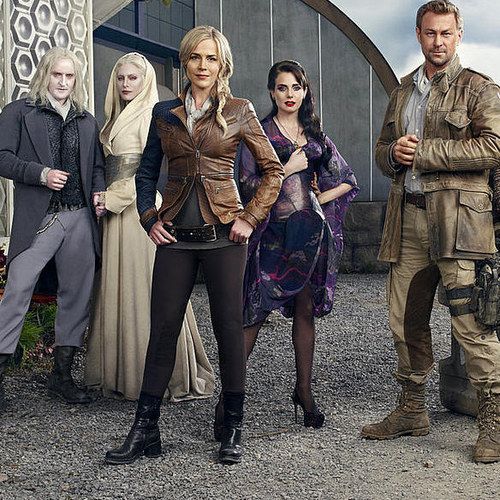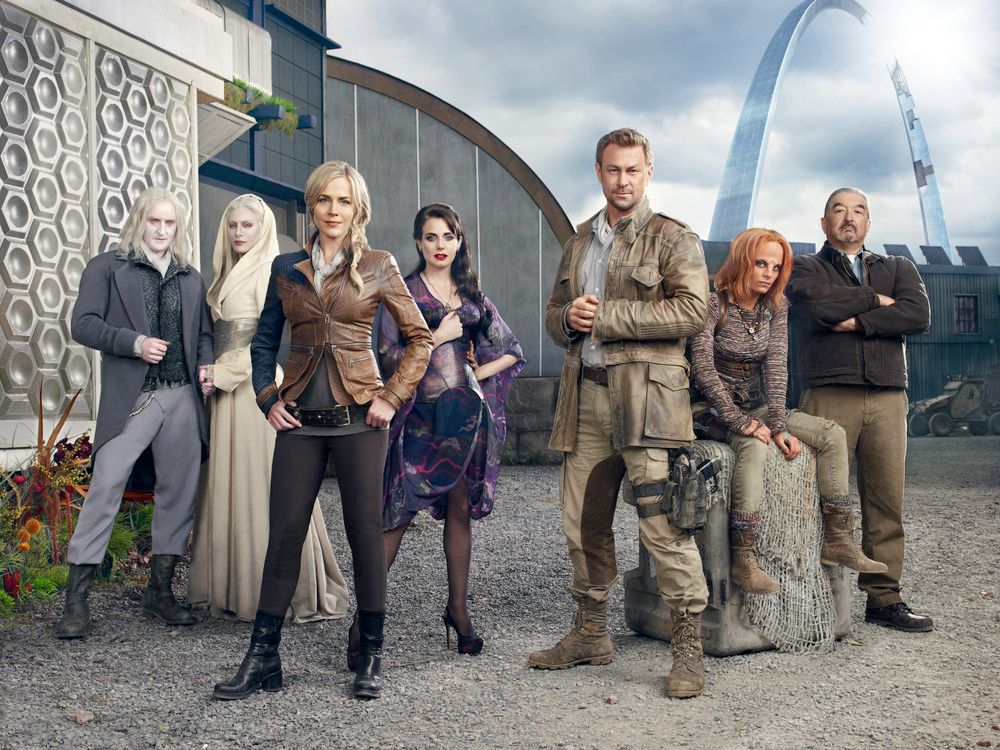Executive producer Kevin Murphy and video game developer Nathan Richardson discuss Defiance, debuting Monday, April 15 on Syfy
The new TV series Defiance is a show unlike any other. The Syfy series, which debuts Monday, April 15 with the Pilot episode, also has the unique component of a video game that is directly tied into the story. Executive producer and showrunner Kevin Murphy recently held a conference call with Nathan Richardson, Trion's Vice President of Development who helped create the video game. Kevin Murphy first spoke about how long this innovative series has been in the works for.
"It's been five years in the making. About five years ago, Dave Howe from Syfy and Lars Butler from Trion got together because Syfy had made a large investment in Trion and they were looking for a project to do together. So they looked through the various properties that, you know that Syfy had in development and they settled on this sort of a world. It took five years of development to get the video game up and running, which is not unusual for a video game, as I think many think, you know, can attest. And it took that long to kind of figure out how it would work as a television show. I came on board the project about two years ago and kind of got us over the finish line, in terms of the shared world. And the big idea really was about, 'How do we create a big universe with two distinct portals that would allow you to enter that world?' And by creating a new world it gave you sort of an infinite sort of number of permutations of ways to tell stories and ways to find characters."
Both the series and video game take place in the same world, but each are set in two different geographical locations, with the show set in St. Louis and the game in San Francisco. Nathan Richardson spoke about how this works for both mediums.
"Yes, also part of it of course is that it's happening in two different geographical locations so that instead of the problems that you have with licensed games and licensed shows, is that they're usually restricting each other, so with geographical difference, and also of course selecting the right kind of world and intellectual property that actually fit for both mediums, both parties are actually quite free to tell pretty compelling stories."
Kevin Murphy also spoke about splitting up the material, in regards to what would best be suited for the show and what would work for the game.
"Well one of the things that we learned early on, that we needed, was a way to keep the mythology of the game and the mythology of the television show up to-date and current because we were having real trouble communicating. Because at Trion they would do a big beautiful bible of everything that was going on in the game, and we would use that as a reference. And we would pull something out and - like some creature or some political figure - and they'd turn out say, 'Oh sorry, that's not it anymore, we took that out.' And they would have the same frustration with us. So we created the position of a mythology coordinator who serves as kind of an editor between what goes into the game and what goes into the television show and helps define connections. And make sure that there's nothing we do in the show that contradicts the reality of the game to make sure that when we do an episode with Hell Bugs in the television show, that we're being accurate as to the biology and what they look like and how they breed and what the various subclasses of Hell Bug are."
He also spoke about the intricate language that was created by the show, by the same man who created the Dothraki language for HBO's Game of Thrones, David Peterson.
"So David Peterson is not only our language creator but he's also our Cultural Consultant on the show because he really has a mind for that sort of nuance. And from his perspective, you can't really create a realistic language without knowing a lot about the culture of the language - the language creators. David Peterson, prior to Defiance, is best known for creating the Dothraki language on the HBO series Game of Thrones. And this presented an even bigger challenge to him because the Dothrakis on Game of Thrones are illiterate; they don't have any written form of their language. We asked them to come and not only create a spoken version of Irathient, but also a written version; a spoken version of Castithan; he's also done Indogene; and Liberata is a work in process, we don't use that as much. But at this point, last time I checked, we were at 1,962 Irathient words and counting. And there are complete rules for grammar, syntax, verbs, and irregular verbs; there's an 150-page orthographic document that he's created. And along the way there are things he's created in terms of what our alien cultures are and who they were on their home world that I don't even completely understand. Like every now and then when he was creating the Irathient language, I would get this weird phone call from David and he'd go, "Is it okay if the Irathient home world sky was kind of red?" "Okay David, sure." "Great, that's going to make everything work." And I had no idea why a red, Irathient sky made the language work but I know that David knows, and that's what's important. So any time we have a question about culture... He created the Castithan caste system, which are called liros, and all of that is all in that magnificent brain of his. So that's really how we do it day-to-day, and Nathan could speak to how they do it in the videogame. But in the show we basically write in English and we put carrots around it and say what it is we want the character to say. David chooses the appropriate language and then makes up the words and the syntax and then adds it to the overall vocabulary. And the languages get bigger and bigger and grander and grander."
When asked what happens when someone finishes the game, Nathan Richardson had this to say.
"No. I'll jump in first and say like that, there's actually a couple of angles to that question and the answer itself, simply because that the game is based on a main storyline, of course, which is telling the story and getting you immersed. But it also has so many other different aspects of the online aspect, which provides much more longevity in game play. What happens there is that we have the crossover elements of course between the show and the game, but there are also live events happening in the game itself when it all continues. So you're still affecting the world itself, even though the show has actually finished its last episode. I mean what happens essentially in the game is material for actually what would happen on Season Two. So the opportunities, like the number of opportunities that we have to actually work with how we play the game and how we work with Season Two is essentially too many options."
Defiance debuts with the Pilot episode Monday, April 15 at 9 PM ET on Syfy.


